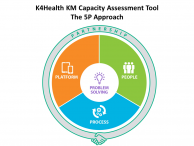People, Process, Platform, Partnership, and Problem Solving: The 5P Approach to Strengthening Knowledge Management Capacity and Culture
This post originally appeared on K4Health's blog on August 10, 2015.
Knowledge management (KM) capacity and organizational culture work together like an engine for initiating, facilitating, and sustaining KM efforts within organizations. However, KM practitioners in global health and development often face challenges in strengthening KM capacity and culture, as they may not be well equipped with a practical tool readily applicable to their specific context and needs.

To address this challenge, in 2013, K4Health first published the “Knowledge Management Capacity Assessment Tool” as Appendix 2 in the Guide to Monitoring and Evaluating Knowledge Management in Global Health Programs (available online and in print). Yet, our work did not stop there. Since then, K4Health has continued our efforts to enhance the initial concept introduced in the first version of the tool.
Based on a thorough review of relevant literature and other assessment tools focused on KM and global health, our main objective was identifying key elements that are simple and easy to remember and will resonate with KM practitioners. We consolidated and developed an extensive list of assessment questions and indicators, then mapped them into five key KM domains.
Three of the five key domains, People, Process, and Platform (Technology), have been linked to a concept that is largely accepted by KM practitioners from disciplines ranging from business to organizational learning. The two remaining domains, Partnership and Problem Solving, are informed and guided not only by the literature review but also by K4Health’s programmatic experience.
Together, the 5Ps of KM form a basis for organizations to assess their KM capacity and culture. The 5P approach helps them examine existing skills, needs, and opportunities so that they can identify areas to be strengthened and draft action plans for improvement.
People are both contributors and users of knowledge in organizations. This domain covers the following three sub-areas:
- resources/human capital required for KM
- leadership, which is the organization’s senior management support to KM
- an organizational culture that supports knowledge sharing and networking
Process represents a series of actions or steps learned and applied to achieve KM objectives within organizations. This domain refers to the following three sub-areas:
- KM strategy that is aligned with the broader mission of the organization
- knowledge flow/cycle of assessing, capturing, generating, adapting, and sharing knowledge
- measurement such as an M&E system and indicators
Platform relates to the organization’s use of online and offline tools and other supporting mechanisms for systematizing and operationalizing KM activities. While the combination of People, Process, and Technology may be more familiar to some KM practitioners, we prefer Platform, as it is broad and flexible. This domain includes the following three sub-areas:
- KM systems
- KM approaches
- information technologies
Partnership can help organizations learn from each other’s experiences and expertise, work effectively with stakeholders and other collaborators, and achieve a shared vision together. This domain covers the following three sub-areas:
- knowledge exchange
- coordination
- networking purposes
Problem Solving is an important skill that organizations need for continually connecting knowledge and performance, as problems occur due to changes in the environment and are regular aspects of our work. This domain includes the following three sub-areas:
- knowledge seeking
- identification of new ideas and problems
- critical thinking
K4Health is currently pre-testing the 5P concept in the updated version of the KM Capacity Assessment Tool, which works as a participatory self-assessment tool and aims to measure the KM maturity and competency of an individual organization and/or a group of organizations (e.g., professional networks, technical working groups). We hope that we can formally share the updated Tool with you in the coming months. In the meantime, we welcome your feedback on the 5Ps of KM!



